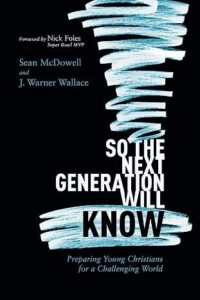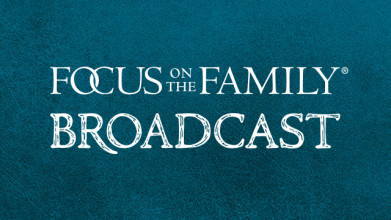J. Warner Wallace: I have great hope, because I already know all of you have already taught your kids and grandkids a bunch of useless nonsense that they embrace as gospel. They follow your teams, they love your hobbies, you’ve already transferred your interest to your kids, you just haven’t transferred this to your kids. So it’s, like, you already know how to do this, it’s just a matter of will you do it?
John Fuller: That’s J. Warner Wallace with some great insights about passing your faith on to your children. We’ll talk more about evangelism and discipleship as it relates to the next generation on today’s episode of Focus on the Family. Your host is Focus president and author, Jim Daly, and I’m John Fuller.
Jim: John, I love this conversation because, uh, J., Jim, has such powerful advice to parents on helping young people with the cultural challenges that they’re facing. Uh, this conversation was recorded in front of some Focus on the Family friends in Dallas, uh, just recently and they were very engaged throughout the discussion. Uh, J. Warner Wallace has some great insights about reaching the next generation for Christ and I think everyone is gonna get a lot out of this conversation. It should help equip you as a parent, or a teacher, or a youth leader to connect with young people better, and help them grow spiritually, and build that Christian worldview that we want to see them follow.
John: Mm-hmm, and J. Warner Wallace is an award-winning cold case homicide detective, uh, national speaker, and an author, and currently serves as a senior fellow at the Colson Center for Christian Worldview, also, as an adjunct professor of apologetics at Biola University. Uh, he and Sean McDowell have co-written a book called So the Next Generation Will Know, which forms the basis for much of the conversation we’re about to hear today. And, Jim, we’re gonna jump into this discussion, as you asked Jim Wallace about the drift away from training in evangelism and apologetics in the Christian community.
J. Warner: Well, I found that surprising, because when I first became a Christian, that’s how I became a Christian. I just looked at the gospels, I was not, I wasn’t raised around other Christians, I was in southern California.
Jim: And you were 35.
J. Warner: I was 35-
Jim: Yeah.
J. Warner: … and we already had kids. Susie and I were toge-, were together probably about 18 years already by that time. So, we walked into this church for the first time and the pastor provoked me, um, to, um- um, think maybe of something more about … He said, “Jesus was super smart,”-
J. Warner: … and I thought, “Oh really? Let’s go see how smart Jesus is,”-
Jim: (laughs)
J. Warner: … so I bought a Bible. Didn’t want to spend a lot of money, I bought a pew bible, it was $6.00. I opened that little pew bible and I started reading through the gospels and I realized … Well what first provoked me was that the gospels, uh, don’t line up perfectly, kind of, you’ve probably noticed this, there are differences in the way people give accounts. And when I saw that I said, “Ew, that’s exactly what you see in eyewitness testimony,” and I don’t care if the event happened two hours ago, if I get five of you together to tell me what happened, there’ll be a level of variations and very similar.
Jim: So that’s an affirming thing?
J. Warner: Yeah, that was an affirming thing for me. So I thought-
Jim: Huh.
J. Warner: … let me test these gospels. Well there’s a template we use in criminal trials that test eyewitnessed, um, statements, it’s in the California jury instructions. So I simply used the template from the California jur-, uh, jury instructions and I tested the gospels under four parameters. And when they passed I told Susie, “I think this is reliable, I think we … This is …” But, uh, I still didn’t understand what the gospel was, but I was at a point where I was willing to entertain it because I realized that the accounts were- were- were passing the test-
Jim: Yeah.
J. Warner: … of reliability, so that’s really how I became a … And I thought, doesn’t everyone become a Christian this way?
Jim: Uh-
J. Warner: And-
Jim: … no-
J. Warner: … and-
Jim: … actually. (laughs)
J. Warner: … and- and, uh, apparently not, now that surprised me. So, years later, um, I was, uh, so I speak around the country, I would ask people, “Why are you a Christian,” and these are the three answers I got, almost always in this way, in this order. The first is, “I’ve, I was raised that way.
Jim: Yeah.
J. Warner: My parents were Christians, I’ve been a Christian my whole life, I was raised in the church,” that is the number one answer when you ask people why are you a Christian. The second is, “I’ve had an experience that demonstrated for me that Christianity was true, either I prayed a prayer for something I needed, um, is, uh, I saw God move in my life in some way, I’ve had an experience that demonstrated Christianity is true,” those are both good answers. The third is, kind of, like the second. “Um, you know, I used to be a jerk, I got saved, I’m not so much a jerk anymore, I’ve- I’ve been transformed in some way.” That’s not a bad answer either. Now those are the three most popular answers.
Jim: Is the fourth, “I was a jerk, got saved, but I’m still a jerk?”
J. Warner: Yes, I hope so-
Jim: (laughs)
J. Warner: … for my sake.
Jim: (laughs)
Audience: (laughs)
Jim: Maybe that’s where-
J. Warner: Yeah.
Jim: … uh, come as you are but don’t stay that way-
J. Warner: Yeah, no I-
Jim: … would apply.
Audience: (laughs)
J. Warner: Yeah, I’m actually hoping-
Jim: (laughs)
J. Warner: … that’s for me. But-
Jim: (laughs)
J. Warner: … but so, uh, the- the reason why this bothered me, that those are the three top answers … You know, I don’t have any Christians in my family, but my dad, uh, has a second wife who is, uh, LDS, uh, she was, she raised her- her family Mormon, so I have half siblings that are raised Mormon. So I do a lot of … I spent a lot of time around Mormons. And if you ask a Mormon, why are you a Mormon, guess what their top three answers are? “I was raised in the church, I’ve had an experience with the Holy Spirit that demonstrated for me that b-, Joseph Smith’s a prophet of God and the Book of Mormon is true, or I’ve been transformed in some way.” They’re the exact same answers folks.
Jim: Hm.
J. Warner: This is also the reason why Muslims are Muslims and Buddhists are Buddhists. I mean, you don’t think those systems are true, yet your answers are the exact same three answers. So, my question is, like, how do we differentiate them between the, a sincere experience, which is evidence, but it’s untested evidence.
Jim: Hm.
J. Warner: So how do you, uh, what, how do you complete that case? So when people ask me, like, “Can you tell me your testimony,” I usually say, “I could, but, uh, to be honest my testimony doesn’t matter and neither does yours, what matters is, is this true?” Because we all have some story to tell, it doesn’t make it true, and boy we are in a culture right now, you know Jim, that that-
Jim: Yeah.
J. Warner: … is how truth is determined, it’s lived experience. We know better, in every other se- sense of what truth is, that that cannot be the only determiner of truth, but when it comes to our religious beliefs that almost always is the only determiner of truth. So, that’s why I think we are where we are in the church, and that’s why I think this is … Uh, let’s put it this way, we’re in Dallas tonight. Okay, there are people in this room who are, for what, I have no reason, I don’t know why they are, but they are Cowboy fans, okay?
Jim: (laughs) Oh man.
Audience: (laughs)
J. Warner: Seriously? Okay?
Jim: Vince, get security.
J. Warner: Okay. So, Dak Prescott, were you, I mean, uh, do you think that Mike’s gonna make him a better quarterback next year, takin’ over the, uh, offensive coordinator responsibilities, do you really think it’s gonna happen, seriously? Maybe it will, I’m a Prescott fan, I hope it does. Here’s my point. Everyone in this room’s got an opinion about it. You actually have studied more, and are better prepared to communicate why you think the Cowboys will do well next year than you are ready to prepare, to defend your own faith.
Jim: Not these folks-
J. Warner: No- no-
Jim: … these folks are ready.
J. Warner: … I’m preachin’ to the choir.
Jim: Yeah, there you go-
J. Warner: But what I’m saying is-
Jim: … good.
Audience: (laughs)
J. Warner: … but what I’m saying is, that’s true for most of us though. In other words, we do a better job of passing on our fandom to our kids than we do to passing on our faith to our kids and we don’t have to think about it, we don’t think about, well what are the five steps I need to to do to make my kids a better Cowboy fan, it just happens organically.
Jim: (laughs)
Audience: (laughs)
Jim: Um, you’ve written this great book, So the Next Generation Will Know. So, let’s- let’s talk about-
J. Warner: Okay.
Jim: … youth for a moment.
J. Warner: Mm-hmm.
Jim: Uh, your research has revealed five important discoveries about the spiritual decline among the youth. I mean there’s something happening here and we need to be aware of it and understand why it’s happening.
J. Warner: Yeah, now, so I’ve, I even brought notes, because I’ll tell you, this- this is a moving target. So I wanted to share with you what I’m seeing in Gen Z and here’s how I got started with that. Um, Susie and I got saved, and we’re at a church, a big church, and our kids are, like, eight and six-ish or so, and, um, they were in children’s ministry. And we would sit in children’s ministry with our kids because it’s a big church and they didn’t want to go in by themselves, they would rather go with us into the big church than sit in children’s ministry. And we’re thinkin’ this is not helping them, let’s just, every other week, you’ll sit with the kids, or I’ll sit with the kids, and the other one will go to big church. So, you know, if you’re in a church like this, and you’re sittin’ in children’s ministry, it’s not long before someone says, “Hey, you need to work in children’s ministry,” (laughs) you know-
Audience: (laughs)
Jim: (laughs)
J. Warner: … ’cause we’re there every week.
Jim: You’re so good with the kids.
J. Warner: Yeah, oh yeah, we don’t … I said, “We don’t know anything, we’re brand new Christians.” “That’s okay, we got curriculum here.
Audience: (laughs)
J. Warner: All you need to be is one week ahead of the kids.”
Jim: (laughs)
Audience: (laughs)
J. Warner: Okay.
Jim: (laughs)
Audience: (laughs)
Jim: (laughs)
J. Warner: So we volunteered.
Audience: (laughs)
J. Warner: So, uh, then that- that deval-, that developed, right? I started a seminary shortly after that, so then I was asked to take over the, like, middle schoolers, and then I was asked to be a youth pastor, and so now I’m doing high school youth pa-, as, uh, I’m working full-time to, uh, doing cold cases. So, my background’s weird enough, I- I came up in the arts, I have a bachelor’s degree in fine art and I’ve got a master’s degree in architorture, uh, from UCLA-
Audience: (laughs)
Jim: Architorture. (laughs)
J. Warner: … and so that’s … And so my first-
Jim: (laughs)
J. Warner: … uh, entry into this, uh, you know, I- I work as a detective, but a lot of it’s visual, uh, tryin’ to make cases visual for juries. Um, so when I started working with high schoolers, I was focused on the visual aspect of that Sunday experience, ’cause I came out of the arts. I did that for a year and these were ama-, ask Susie, these were, like, crazy events every Sunday, it was in a visual experience, and after one year all of those kids left the faith. They went to college, their friends told us only one continued to be a Christian-
Jim: Wow.
J. Warner: … and I said, “Okay.” By … And we’re talkin’, like, by the Thanksgiving break of the freshman year in college, I was hearing from the friends who were younger, “Oh, so and so is no longer a Christian. UC Berkeley, he’s no longer a Christian.” I said, “Whatever we’re doin’ we stink at it, we’re not doin’ this anymore.” And we flipped it, and I started, I went back to everything that- that I examined when I first became a Christian and we just taught Christian case-making worldview from that point on and the transformation was dramatic and immediate. And that’s really why we wrote this book, because we learned so much about that train wreck, (laughs) um, just following the arts entirely, and flipping it to really, uh, think, uh, you know, thinking clearly about why is this evidentially true and that’s when it all changed for us. And here’s what I’m seeing in young people, first of all. You already know it, if it’s not your children it’s your grandchildren. And I can tell you, Susie and I are now grandparents and if you need me to prove it I’ve got 650 photographs in my phone from the last-
Jim: (laughs)
J. Warner: … two weeks alone to show you that my g-, I’m a grandparent.
Jim: I have two Zers, so I’m lookin’ forward to this-
J. Warner: There you go.
Jim: … 22 and 20.
J. Warner: Okay, so- so here’s what I would say about this, uh, a- a couple of these you already know. Number one, these are digital natives. So, I’m not a digital native, I came to this late. We are all digital immigrants. Okay, these are digital natives, they’ve been here all along. They don’t know life without that digital media in their hand and that changes things. So just, you know, you already, kind of, know that, but it does change what … This is why I try to take a visual approach with my students because I know that the greatest complement I can get in a church service is when a parent comes up to me and says, “Hey, I just want you to know, for the first time in weeks my kids did not look at their phone durin’ the church surface.” I’m thinkin’, “Okay, that’s the goal.” The goal is, I know that’s the tug of war. And because they’re digital natives, they are or, uh, really good researchers-
Jim: Yeah.
J. Warner: … and almost anything that we might have said in the past that would- would have felt like it was authoritative, “Really? Well do you have the blue check by your name online, (laughs) then you’re not really that authoritative, are you?” So they’re- they’re digital researchers and they- they, uh, have, kind of, um, falsely embraced what appears to be authoritative online.
Jim: Uh, can I give you an example of the research side?
J. Warner: Mm-hmm.
Jim: So my 22 year old, Trent, I was giving him the speech that nothing good happens after midnight and he said to me, “Do you have empirical data to support that?”
J. Warner: (laughs)
Audience: (laughs)
Jim: I mean that … (laughs) And then I went-
J. Warner: Yeah.
Jim: … “No, (laughs) but it seems right”- (laughs)
Audience: Huh.
J. Warner: Yeah-
Jim: … But that’s how-
J. Warner: … yeah, no, exactly.
Jim: … they come back to you.
J. Warner: That’s exactly how they come back to you.
Jim: Yeah.
J. Warner: I think, also, with digital media, so it makes us incredibly impatient. So I notice, for example, if I was to show a picture on the wall of, uh, or I just- just t- type the word cheetah, and you saw that picture on the wall, that would just, yeah, you knew that I was talkin’ about a cheetah. But if I show you an image of a cheetah, that’s more compelling. Well if I show you a video of a- a cheetah running, that’s, like, whoa, those things are fast. And here’s what I noticed, I could show that video, but if it goes more than about five or six seconds, everyone’s, like, “Okay, enough already.” We are so … The- the … We have become so visual-
Jim: Yeah.
J. Warner: … that a video doesn’t even hold our attention past, pa-, it better do something new. If this is the same cheetah running for 10 seconds, I’m already checked out at five. Then I think, also, because we’re exposing our kids to so much more online that they are much more fluid in their thoughts, like, what is right and what is wrong, it’s a much more fluid dynamic. What’s a family, what’s not a family, it’s much more afflu- … What’s a marriage, what’s not a … Because so many ideas are being presented with equal authority and so that’s where I think it’s some of the struggle for us is.
Jim: Uh, it- it … That is, kind of, where we’re at today, though, I mean-
J. Warner: No, I think the way it is.
Jim: … I think we’re already gotten to that point.
J. Warner: Yeah.
Jim: When it comes to faith and we’re not, and we didn’t cover all five, but-
J. Warner: No, we can’t, yeah.
Jim: … but, uh, but we’re there.
J. Warner: … yeah.
Jim: I think we get an idea of the landscape. When it comes to-
J. Warner: Mm-hmm.
Jim: … faith and the reason they’re giving, the Zers, why they’re not sticking with the faith, what do you hear?
J. Warner: Oh, okay, so that’s something that you can collect, ’cause we actually do data on this, and there’s two ways you can recover this kind of data. One is, you can do a multiple choice kind of a, uh- uh, the, as you … But then you’re assuming you know why they’re checking out and they’re just picking one of those. The- the best, uh, surveys are the ones that are just open. Tell me what it is that is giving you a problem. Tell me what it is that you’re reluctant about. Now, this is changing so fast, I think, honestly, that I can only give you a snapshot and I don’t think this … I think if we took, did more studies in the next two years, we’d find different kinds of answers. I’ll tell you what, in the last, say, five, it, kind of, looks like I’ve collected the statements. So these are actual responses, in surveys, in the last five to six years, but I think it’s changing and I’ll- I’ll tell you how I would add to this, but I’ll just give you a couple of these. Um, when people say, “Well why … What is, what is your problem with Christianity, or why did you, why are you no longer a Christian,” that’s a question we all have as parents, right, and grandparents, like, why would you leave? Well, s-, a lot of it is just simple responses about having a problem understanding how we can believe in anything supernatural. Some of this stuff, quote, “Is just too farfetched for me to believe,” or there are just too many, uh, questions that cannot be answered by the world, by the worldview. “I’m a scientific- scientific person, I believe, that science is authoritative and I don’t, uh, know how you can believe in miracles,” those kinds of questions are all a part of it. It’s, like, one person here says, “Because I grew up and realized it was a story like Santa or the Easter Bunny-
Jim: Hm.
J. Warner: … I don’t think I want to be identified with this.” It’s an identity issue. And I’ll bet ya, if you do a survey in the next five years, you’re gonna find that a lot more of these answers are gonna be identity related. Look, if this is a worldview I have to adopt, to estrange myself from all of my friends? So I really think it’s about the goodness of Christianity is gonna come under attack as we go forward. And- and by the way, we already see this, right? You’re seeing this online, the way that we’re gonna minimize Christians, uh, Christianity’s impact on politics, for example, is gonna be to make us look foolish, um, to make us look evil.
Audience: Hm.
J. Warner: So it’s the goodness of our worldview that I think is gonna be the bigger attack and-
Jim: And-
J. Warner: … we have, the parents have to help our kids see that. They just need to be reminded of why this is both true and good.
John: That’s a great aspirational goal for us, uh, J. Warner Wallace describing Gen Z and our need to share the goodness of God and biblical truth. Uh, Mr. Wallace’s book, uh, written with Sean McDowell, is called So the Next Generation Will Know, and you can find out more about getting a copy when you call 800, the letter A, and the word FAMILY. Let’s continue now the conversation with a live audience in Dallas. Here’s Jim Daly and J. Warner Wallace on Focus on the Family.
Jim: When you look at some of the adjectives describing the younger generation, let- let’s touch on those, because I’ve- I’ve been actually encouraged. I mean they tend to be people seeking authenticity-
J. Warner: Yup, absolutely, high value.
Jim: … they- they can, really do sniff out hypocrisy.
J. Warner: Yeah, this generation, I think, is even more. So isn’t it funny how we will sometimes look at the generation before us and whatever the struggle is in that generation we end up reacting to it. Do you remember … What was the sitcom with Michael J. Fox in it, uh, Family Ties?
Audience: Family Ties.
J. Warner: Yeah, Family Ties. Wasn’t that the one where he’s the conservative, like, teenager and his parents are, like, the … Well what do you see happening there? You see one generation is always reacting to the one that comes before it. So, I do think that after the crash in 2008, I think you see a lot of young people seeing their parents or seeing their older siblings struggle. This is a- a- a- a good work ethic, uh, group, it’s the- the largest group. So of all these generations that are coming up, Gen Z is a huge group of people. So you’re gonna see a lot of impact from Gen Z because they’re just gonna outnumber us, because they are a large group, so it’s somethin’ to think about. And yeah, they are saying, uh, they- You know, why would you be surprised? In the one generation that- that is seeing so much ridiculous Instagram falsity, (laughs)-
Audience: Hm.
J. Warner: … that they would be, um, interested in authenticity? I don’t think I was ever exposed to so much inauthenticity as a kid, right, because we, I mean we didn’t have those kinds of social media platforms where you’d know the person, but look how he looks online. He looks great-
Jim: (laughs)
J. Warner: … online, but you know this person in reality. I think-
Jim: Right.
J. Warner: … we can s- … Our- our detectors are a little bit more-
Jim: No, I’m laughing. I think … Isn’t there some ab app you can put on your (laughs) stomach? (laughs)
J. Warner: Yes, I know, it’s, like, yeah.
Jim: Talk about inauthentic.
J. Warner: Yeah, e- exactly-
Jim: (laughs)
J. Warner: … exactly.
Jim: It’s just funny.
J. Warner: Well, you know, there’s all these filters. Everything’s got a filter to change, “Hey, this is what I look like 15 years earlier.” They have these, now these young filters on- on these platforms to make you see your earlier age of yourself. But my whole point is, the technology, I think, has driven us toward, um, a desire to see what’s real and that’s where I think parents and grandparents, we still can play in the game here because it turns out that what I see happening is, and I used to sign books at the book table, and I have parents who would come up to me and they’d say, “Hey, can you sign a book …” Maybe s-, maybe it sound, like, a book that makes the case for the reliability of scripture. “Can you sign a book to my 22 year old daughter, she is no longer a Christian.” And, uh, this, yeah, started happening years ago. And I would always say, “I can sign the book to your daughter, she’s not gonna read it, but if it’ll make you feel better, I’ll sign a book to your daughter.” But it turns out what- what connects the dots for young people, for anyone, is information connected to relationship, it’s information and relationship. And I get it, she’s, like, “I don’t have the information I need,” but you have the relationship. I have the information, but I don’t have the relationship, so I’m just nobody to her. You get the book and you read it, because then you’ll have both of those things, the information and relationship-
Jim: Hm.
J. Warner: … and that’s where I think it’s so powerful. So I’m not des-, I don’t, I’m not despondent about this, I have great hope, because I already know all of you have already taught your kids and grandkids a bunch of useless nonsense that they embrace as gospel. They follow your teams, they love your hobbies, you’ve already transferred your interests to your kids, you just haven’t transferred this to your kids. So it’s like you already know how to do this, it’s just a matter of will you do it?
Jim: Yeah. Well in that context, though, you know, when the kids, especially, uh, 18, 19, 20, they go off to college, they’re getting a lot of worldly information. And you mention, you know, so many of ’em in that-
J. Warner: Mm-hmm.
Jim: … first semester, start to pull away and what they’re hearing in college classrooms puts doubt into them. So, wh- what’s the art of when they’re home for the Christmas break-
J. Warner: Yeah.
Jim: … and now you’re having the debate about evolution or some other aspect of something they’ve learned in that first, second semester of college? Ha- … Temperamentally, as a parent, how do you go about absorbing that and still influence them?
J. Warner: Okay, so a lot- lot of you have kids who are that age and, um, so what I’m about to say may … I don’t want it to be a- a, um, buzz kill, okay, but- (laughs) but (laughs).
Jim: Okay I think you just started setting us up for a buzz kill.
Audience: (laughs)
J. Warner: Yeah. So-
Audience: (laughs)
J. Warner: … so, uh, here’s what I- I hear people, “Oh, it’s- it’s changed,” right? So when I was a youth pastor, we were still in a couple, first couple of years of the technology that now is so prevalent, ’cause, uh, we just started doin’ this, what, 15 years ago, my kids are 34. 34, 32, so you’re look, this is a long time ago. And- and, uh, what I think has to change now, is that you are not meeting the first objection at your university in your freshmen year, you are meeting the first objection the minute your parents give you the glowing rectangle. If they’re gonna give you the glowing rectangle, you, you’re gonna be introduced to every aspect of doubt that you can possibly imagine.
Jim: Hm.
J. Warner: So, where you might have said, “Hey, we want to do apologetics and worldview with high schoolers when they’re seniors,” uh, really, no. You need to do apologetics and worldview with 7th and 8th graders because those are the years that you’re giving them the phones. Or somebody else is givin’ their friends a phone, so they’re gonna be exposed to it-
Jim: Mm-hmm.
J. Warner: … so, they need to know earlier. So that’s why we started writing kids books in- in apologetics. We- we targeted eight to 12, ’cause at that- that age range, seems like that’s when you have the most influence on your kids, so that’s why I want to focus on it and it- it does come down to relationship. Look, I am J. Warner Wallace. You know why I’m J. Warner Wallace? Because I have a grandfather named Warner and I want that relationship. He’s been dead for years, um, but it’s relationship that changes everything. And if you think, uh, that … You know I’m a grandparent now, I’m not a parent anymore. Well it turns out, uh, sorry, it turns out that I only remember my grandfather when he was probably in his 60s and 70s. Like, I didn’t know him well enough before then. Everything I want to be is from hangin’ out with a guy who was in his 60s, 70s, and 80s. Don’t think for a second you don’t have impact on your grandkids. These are the decades when you are gonna have impact, these are the ones they’re gonna remember. When I was 10 I don’t remember my grandfather. When I was 17, oh man, he changed my life. So, just- just know that you have a role to play still and it is about relationships.
Jim: Absolutely. You’ve mentioned relationship, uh, many times and I think this is the key question for those parents that, perhaps, there’s a breach in that relationship.
J. Warner: Mm-hmm.
Jim: You know, they have tried the intellectual approach, they have somewhat hammered their child, who maybe wasn’t receptive-
J. Warner: Right.
Jim: … and they were behind the curve ’cause they weren’t sure what they were battling.
J. Warner: Right.
Jim: The junior higher, that became the freshman, that became the senior, how would you suggest those breaches be repaired relationally so that their hearts might open up?
J. Warner: Well first of all, forgive yourself. Look guys, no one’s made more mistakes than Susie and I have. You know, we can sit up here and talk like we have some author- … This is a … That’s ridiculous, trust me, no one has stubbed their toe more times than Susie and I have on this whole thing. And if you knew me at 34, you would, uh, say, “That dude is never gonna be a Christian.”
Jim: Hm.
J. Warner: And so if my kid’s at 34 and he’s not all the way in, I’m patient because God’s gonna do what God’s gonna do. I never thought for a second anything I really said, is God’s just using what I’m saying, but it’s not me doing anything, it’s all God using what little I can present, so, I- I just went to trust. And so we still pray, we pray a lot about our kids, our kids are all grown and out of the house. You still pray for your kids, right? I guarantee you, if you’ve got five kids in this room, if one of you got five or six kids, or four kids, three kids, that your kids are on a spectrum. There’s some kids who are more in this, in, and some kids who aren’t. (laughs) And maybe they’re all really committed believers, there’s still a spectrum though, some are more in than others. And if they’re not believers, then some are less atheistic than others. There’s a spectrum in your kids, even though they came out of the exact same house. So, um, just be patient with yourself. I think the- the biggest problem is we think we gotta fix this. We- we probably can’t fix it, it’s probably something that we have to trust God for.
Jim: Yeah, it’s so- so good. One of the other things is I’ve heard Christian leaders say this and it really … I’ve thought quite a bit about it and it’s gotten under my skin a little bit when we talk about, you know, this next generation just doesn’t have it.
J. Warner: (laughs) Yeah, everyone-
Jim: And it’s- it’s what … The way I’m hearing that now is, “God didn’t really prepare for this-
J. Warner: Yeah.
Jim: … and that the people he’s chosen to live in this next generation-
Audience: Huh.
Jim: … well, he’s come up a little short” according to us-
J. Warner: Yeah, exactly.
Jim: … (laughs) right? I mean, that’s a pretty prideful thing to think about.
J. Warner: Well, I think it’s just, it’s our nature or age bias. So- so, my- my- my co-writer on this book is- is a great man named- named Sean McDowell, he’s Josh McDowell’s son, and I hate to even say he’s Josh McDowell’s son because Sean is, uh, is awesome on his own right-
Jim: He is, he is.
J. Warner: … it wouldn’t matter if he was Josh’s son or not. But- but- but he always, he- he always starts, he’ll ask the audience, and I’m, we’ve done this a number of times where I’ll say, “Okay, I want you to, okay, we’re talkin’ about Gen Z, give me some words to describe Gen Z,” and- and people will say, you know, if I asked you, what are some words about Gen Z?
Jim: (laughs)
J. Warner: Can you describe Gen Z for me? Just throw- throw out an, a word, uh, an adjective for Gen Z, throw one out.
Audience: Selfish.
J. Warner: Selfish, okay, what else, what else?
Audience: Entitled.
J. Warner: Entitled, yeah, go ahead.
Audience: Impatient.
J. Warner: Impatient, okay, go ahead. One more, just one more.
Audience: Distracted. Lazy.
J. Warner: Distracted, okay, lazy, okay. I want you hear those five words. Now, the people we’re tryin’ to reach, what did you just say about them? You don’t think they hear those things, you don’t think they get that from us? And this is the problem, is that when I ask you for five descriptors, the first five you think of are all desperately negative- negative- negative- negative and then we’re gonna reach this group? Folks, the church is raising kids, we’ve always been raising kids. You’re in the church, you’re raising those kids, it is time for us to make this … “Oh, but I don’t like that kind of music in the worship service.” Really?
Audience: (laughs)
J. Warner: The worship music could be terrible, I’m still not, I’m still in. But if my kids don’t, uh- uh, I- I, you’re making comp, it’s time to make compromises. You do this as a, in a season, as a parent all the time and now I don’t care who you are, with kids or without kids, if you’re in the church you’re raising kids, we have to make a similar sacrifice.
Jim: J. Warner Wallace, this has been wonderful. What a great resource, uh, So the Next Generation Will Know. Um, I’m definitely diggin’ into this for my boys’ benefit too and mine. Thanks for bein’ with us.
J. Warner: Thanks for havin’ me, I appreciate you.
Audience: (clapping)
John: What a terrific discussion with J. Warner Wallace today on Focus on the Family based on his book that he co-wrote with Sean McDowell.
Jim: Yeah, John. Um, Jim brought such a powerful reminder that we need to pass along a lasting faith to our children and, uh, we also have to help them build the confidence to share their faith with others. Now I’m optimistic that we’ll see many- many young people come to Christ in the next few decades if we’ll remain faithful and prayerful as believers, not get overwhelmed, and, kind of, down in the mouth, right?
John: Mm-hmm.
Jim: J. Warner Wallace has a lot more advice, uh, to help young people with their faith in his book, So the Next Generation Will Know. And when you send a- a gift of any amount to Focus on the Family, monthly or one-time, we’ll send you a copy as our way of saying thank you.
John: Yeah, join the support team today, donate, uh, generously, and get your copy of that book when you call 800, the letter A, and the word FAMILY, 800-232-6459, or you can visit us online at focusonthefamily.com/broadcast. On behalf of Jim Daly and the entire team, thanks for listening today to Focus on the Family. I’m John Fuller inviting you back as we once again help you and your family thrive in Christ.



















